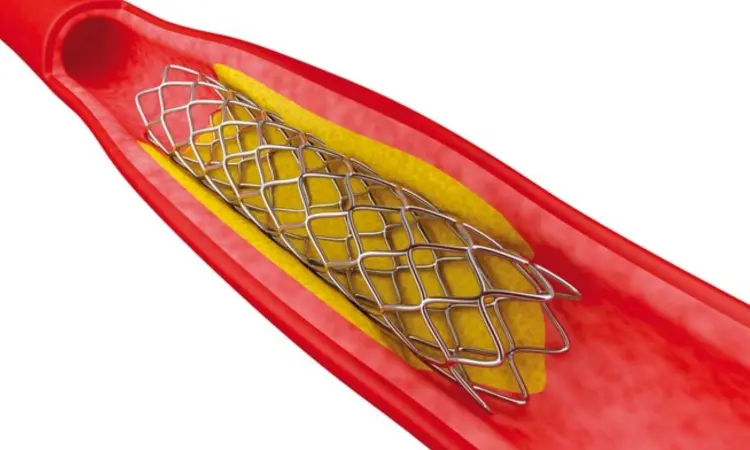- Home
- Medical news & Guidelines
- Anesthesiology
- Cardiology and CTVS
- Critical Care
- Dentistry
- Dermatology
- Diabetes and Endocrinology
- ENT
- Gastroenterology
- Medicine
- Nephrology
- Neurology
- Obstretics-Gynaecology
- Oncology
- Ophthalmology
- Orthopaedics
- Pediatrics-Neonatology
- Psychiatry
- Pulmonology
- Radiology
- Surgery
- Urology
- Laboratory Medicine
- Diet
- Nursing
- Paramedical
- Physiotherapy
- Health news
- Fact Check
- Bone Health Fact Check
- Brain Health Fact Check
- Cancer Related Fact Check
- Child Care Fact Check
- Dental and oral health fact check
- Diabetes and metabolic health fact check
- Diet and Nutrition Fact Check
- Eye and ENT Care Fact Check
- Fitness fact check
- Gut health fact check
- Heart health fact check
- Kidney health fact check
- Medical education fact check
- Men's health fact check
- Respiratory fact check
- Skin and hair care fact check
- Vaccine and Immunization fact check
- Women's health fact check
- AYUSH
- State News
- Andaman and Nicobar Islands
- Andhra Pradesh
- Arunachal Pradesh
- Assam
- Bihar
- Chandigarh
- Chattisgarh
- Dadra and Nagar Haveli
- Daman and Diu
- Delhi
- Goa
- Gujarat
- Haryana
- Himachal Pradesh
- Jammu & Kashmir
- Jharkhand
- Karnataka
- Kerala
- Ladakh
- Lakshadweep
- Madhya Pradesh
- Maharashtra
- Manipur
- Meghalaya
- Mizoram
- Nagaland
- Odisha
- Puducherry
- Punjab
- Rajasthan
- Sikkim
- Tamil Nadu
- Telangana
- Tripura
- Uttar Pradesh
- Uttrakhand
- West Bengal
- Medical Education
- Industry
Stenting Outperforms Endarterectomy but Offers Only Modest Benefit in Asymptomatic Carotid Stenosis: CREST-2 trial

The findings of the CREST-2 trial published in NEJM have revealed that in asymptomatic carotid stenosis, endarterectomy offered no advantage over intensive medical therapy in reducing stroke or mortality. Carotid stenting provided a small stroke-prevention benefit over 4 years compared with medical therapy alone, though experts recommend limiting stenting primarily to symptomatic patients due to the modest absolute benefit. The study was conducted by Thomas G. and colleagues.
Asymptomatic carotid stenosis of ≥70% has conventionally been treated with revascularization for the purpose of preventing a future ischemic stroke. However, baseline outcomes have dramatically improved due to the evolution of intensive medical management that includes antiplatelet therapy, lipid-lowering agents, and aggressive risk factor modification, thus raising questions about the value added by invasive procedures. The present investigation evaluated whether adding carotid-artery stenting or carotid endarterectomy to optimized medical therapy conferred superior protection against stroke and death compared with medical therapy alone in patients without recent neurological symptoms.
Two parallel, observer-blinded clinical trials across 155 centers in five countries were conducted. Patients with high-grade asymptomatic carotid stenosis (≥70%) were enrolled and then randomly assigned to either intensive medical therapy alone or intensive medical therapy plus revascularization. The stenting trial randomly assigned 1245 patients to either medical therapy alone or carotid-artery stenting plus medical therapy, whereas the endarterectomy trial randomly assigned 1240 patients to medical therapy alone or carotid endarterectomy plus medical therapy. The primary outcome was a composite of any stroke or death from randomization to 44 days or ipsilateral ischemic stroke during the remaining follow-up period, extending to 4 years.
Results
• In the stenting trial, the 4-year incidence of the primary composite outcome was 6.0% (95% CI, 3.8 to 8.3) in the medical-therapy group and 2.8% (95% CI, 1.5 to 4.3) in the stenting group, reflecting a statistically significant reduction with stenting (P=0.02 for the absolute difference).
• This indicated a clear benefit for adding stenting to intensive medical management for long-term stroke prevention.
• By comparison, in the endarterectomy trial, the 4-year incidence of primary outcomes was 5.3% (95% CI, 3.3 to 7.4) in the medical-therapy group and 3.7% (95% CI, 2.1 to 5.5) in the endarterectomy group, without a statistically significant difference (P=0.24 for the absolute difference).
• The stenting trial reported no strokes or deaths during the early perioperative period (day 0 to 44) in the medical-therapy group, compared with seven strokes and one death in the stenting group.
• During the same early perioperative period, the endarterectomy trial reported three strokes in the medical-therapy group and nine strokes in the endarterectomy group, emphasizing an early procedural risk of surgical intervention.
In patients with high-grade asymptomatic carotid stenosis, the addition of carotid-artery stenting to intensive medical management significantly lowered the risk of perioperative stroke, death, or ipsilateral ischemic stroke over 4 years, whereas carotid endarterectomy did not exhibit a significant benefit. These findings support a more selective and evidence-based approach to revascularization, focusing on intensive medical therapy with stenting reserved for properly selected patients.
Reference:
Brott, T. G., Howard, G., Lal, B. K., Voeks, J. H., Turan, T. N., Roubin, G. S., Lazar, R. M., Brown, R. D., Jr, Huston, J., 3rd, Edwards, L. J., Jones, M., Clark, W. M., Chamorro, Á., Llull, L., Mena-Hurtado, C., Heck, D., Marshall, R. S., Howard, V. J., Moore, W. S., … CREST-2 Investigators. (2025). Medical management and revascularization for asymptomatic carotid stenosis. The New England Journal of Medicine, NEJMoa2508800. https://doi.org/10.1056/NEJMoa2508800
Dr Riya Dave has completed dentistry from Gujarat University in 2022. She is a dentist and accomplished medical and scientific writer known for her commitment to bridging the gap between clinical expertise and accessible healthcare information. She has been actively involved in writing blogs related to health and wellness.
Dr Kamal Kant Kohli-MBBS, DTCD- a chest specialist with more than 30 years of practice and a flair for writing clinical articles, Dr Kamal Kant Kohli joined Medical Dialogues as a Chief Editor of Medical News. Besides writing articles, as an editor, he proofreads and verifies all the medical content published on Medical Dialogues including those coming from journals, studies,medical conferences,guidelines etc. Email: drkohli@medicaldialogues.in. Contact no. 011-43720751


